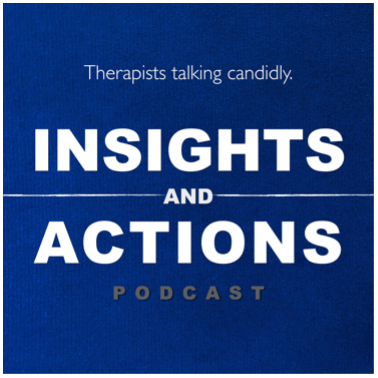Cyndi Turner's Blog, page 5
March 27, 2024
Therapists Talk: What Makes Relationships Work
The latest episode of the Insights & Actions podcast is out now! In this episode, Craig James, LCSW, LSATP, MAC, Matt Christian, LCSW, and Johnny Pierce, PsyD talk about romantic relationships, from the perspective of what they see in their therapy offices.
In addition, the guys discuss:
The idea of “the one” and our misguided cultural expectations,Looking at how you may be contributing to the relationship dynamics that you’re experiencing,Dating app stats,How to decide whether to stay in a relationship,…and much more!
Have you ever wanted to hear what therapists really talk about when they’re out of session? The Insights & Actions podcast allows you to do just that. Insights & Actions are candid conversations with Insight Into Action Therapy and Insight Recovery Centers’ clinical team.
Insights & Actions can be found on YouTube, Spotify, Apple podcasts, Amazon music, and Audible.





If you would like a free consultation with a therapist at Insight Into Action Therapy, please contact us!

The post Therapists Talk: What Makes Relationships Work appeared first on Insight Into Action Therapy.
March 15, 2024
Are We Overusing “Trauma”?
In this clip, taken from the inaugural episode of the Insights & Actions podcast, “The Problem of Overindulged Kids,” Craig James, LCSW, LSATP, MAC, Matt Christian, LCSW, and Johnny Pierce, PsyD discuss whether, as a culture, we are overusing the idea of “trauma.” Furthermore, can therapists become part of the problem?
Have you ever wanted to hear what therapists really talk about when they’re out of session? The Insights & Actions podcast allows you to do just that. Insights & Actions are candid conversations with Insight Into Action Therapy and Insight Recovery Centers’ clinical team.
Insights & Actions can be found on YouTube, Spotify, Apple podcasts, Amazon music, and Audible.





If you would like a free consultation with a therapist at Insight Into Action Therapy, please contact us!

The post Are We Overusing “Trauma”? appeared first on Insight Into Action Therapy.
Lamictal vs. Lithium for Bipolar Disorder
Bipolar disorder is a chronic mental health condition characterized by significant changes in mood, energy, and activity levels. This condition affects millions of people worldwide and can be debilitating if left untreated. Fortunately, there are effective treatments available for bipolar disorder, including medication therapy.
Two of the most common medications used to treat bipolar disorder are Lamictal, also known as lamotrigine, and lithium. Exploring the differences between these two medications can help individuals understand their benefits and drawbacks.
Insight Into Action Therapy provides a comprehensive bipolar treatment program in Ashburn, Virginia, that includes individual therapy, group therapy, and medication management. Our experienced therapists and psychiatrists work together to create personalized treatment plans tailored to each individual’s needs.
Call us today at 703.935.8544 to learn more about our bipolar treatment in Virginia and how we can help you or a loved one manage this condition.
Lamictal vs. Lithium: Understanding the DifferencesLamictal, also known as lamotrigine, is an anticonvulsant medication that is used to treat bipolar disorder. It works by stabilizing mood and reducing the frequency and severity of manic and depressive episodes. Lithium, on the other hand, is a mood stabilizer that has been used for decades to treat bipolar disorder. It works by reducing the activity of certain chemicals in the brain that are associated with mood swings.
One of the critical differences between lithium versus Lamictal is how they are metabolized in the body. Lamictal is metabolized through the liver, while lithium is metabolized through the kidneys. This means that patients with liver or kidney problems may need to avoid one or the other medication.
Another difference between the two medications is their side effects. Lamictal is generally well-tolerated by most patients, with only mild side effects like headache, nausea, and dizziness. Lithium, on the other hand, can cause more significant side effects like weight gain, tremors, and thyroid problems.
Lithium vs. Lamictal: Which Is Better for Bipolar Disorder?The answer to this question depends on the individual patient. Both Lamictal and lithium are effective treatments for bipolar disorder, and each medication has its own set of benefits and drawbacks. Some patients may respond better to one medication than the other, while others may require a combination.
In general, Lamictal is preferred for patients who have more depressive symptoms, while lithium is preferred for patients who have more manic symptoms. However, every patient is unique, and treatment decisions should always be made in consultation with a qualified mental health professional.
Bipolar Treatment in Virginia: How Insight Into Action Therapy Can HelpIf you or a loved one is struggling with bipolar disorder, Insight Into Action Therapy can help. Our outpatient substance use disorder and mental health program in Northern Virginia offers a range of therapies and treatments for bipolar disorder, including medication-assisted treatment with Lamictal or lithium.
Our team of experienced therapists is dedicated to providing personalized care and support to every client we serve. We take a client-centered approach to treatment, tailoring our programs and services to meet each individual’s unique needs and goals. Our programs include adolescent and teen programs, aftercare, neurofeedback, process addiction treatment, and more.
In addition to our traditional therapies, we offer nutrition education and counseling to help clients optimize their overall health and well-being. We are committed to providing a safe, supportive, and inclusive environment for all clients, regardless of their sexual orientation or identity.
Contact Insight Into Action Therapy Today to Start Bipolar TreatmentIf you or someone you love is struggling with bipolar disorder, don’t wait to seek help. Contact Insight Into Action Therapy today to learn more about our bipolar treatment program in Ashburn, Virginia, and how we can help you achieve lasting recovery and wellness.
Call 703.935.8544 or complete our online form to get started.
The post Lamictal vs. Lithium for Bipolar Disorder appeared first on Insight Into Action Therapy.
February 23, 2024
What Is the Importance of Couples Therapy?
Couples therapy is specifically designed to help individuals in a relationship. It aims to improve the communication between partners and help them identify and address the root causes of their relationship issues.
If you are struggling in your relationship, couples therapy can help. Insight Into Action Therapy provides a safe and supportive environment for couples to work through their issues and strengthen their relationship. Our therapists are trained to help couples identify negative patterns, communicate effectively, and deepen their emotional connection.
Contact us today at 703.935.8544 to learn more about our couples therapy program and how we can help you and your partner. Our team of experienced therapists is here to support you on your journey to a healthier, happier relationship with the advantages of couples therapy.
What Is Couples Therapy?Couples therapy involves working with a trained therapist to explore the issues affecting a couple’s relationship. The goal is to help both partners communicate with each other better, develop new communication skills, and build a more understanding and loving relationship. Couples therapy is highly recommended for couples dealing with issues such as communication problems, trust issues, and infidelity.
Couples Therapy BenefitsIt is not just for couples in crisis; it can also benefit couples who want to enhance their relationship. What’s the importance of couples therapy? The following are some benefits:
Improved CommunicationThe most crucial benefit of couples therapy is improved communication. It helps couples to learn new communication skills, such as active listening techniques, which can help to improve their understanding of each other’s thoughts and feelings. This can help reduce misunderstandings and conflicts and promote a more harmonious relationship.
Conflict ResolutionCouples therapy provides a safe and neutral environment where couples can work on their conflicts without fear of judgment. A trained therapist can help couples identify the root of their arguments and suggest ways to resolve them. Couples therapy can also help individuals learn how to express themselves healthier, leading to a more peaceful and satisfying relationship.
A Safe Place for ExpressionCouples therapy provides a safe space where couples can freely express their thoughts and feelings without fear of judgment or reprisal. A therapist can provide a safe and non-threatening environment for couples to open up to each other and explore the root causes of their problems.
Why Should Teens Consider Couples Therapy?Couples therapy allows teens to communicate more effectively with their partner. As teenagers learn to communicate better and increase their emotional intelligence, they develop confidence and assertiveness in expressing themselves. Through couples therapy, they learn how to express their feelings and emotions, making them better listeners and communicators, which is essential for building and strengthening relationships.
Another advantage of couples therapy for teens is that it helps them understand the importance of healthy relationships. With guidance from their therapist, they learn how to identify negative behaviors in their relationship, such as jealousy, controlling behavior, and manipulation. Working through these negative behaviors teaches them the importance of healthy relationships built on trust, compassion, and mutual respect.
A key aspect of couples therapy is also learning how to manage stress more effectively. With the academic, social, and familial pressures teenagers face, they must learn how to manage stress in their personal lives and relationships. By developing healthy relationships, they can rely on their support system to manage stress instead of turning to harmful coping mechanisms like substance abuse.
Call Today to Start Couples Therapy at Insight Into Action TherapyCouples therapy is a highly effective way to improve a relationship, providing many benefits to both partners. Insight Into Action Therapy offers a comprehensive couples therapy program tailored to each couple’s needs. Whether you are dealing with communication, trust, or other issues, our trained therapists can help you overcome these challenges and build a healthier relationship.
Contact us today at 703.935.8544 or online to learn more about the benefits of couples therapy for teens and how we can help.
The post What Is the Importance of Couples Therapy? appeared first on Insight Into Action Therapy.
February 9, 2024
Where Can I Find Teen Addiction Treatment in Ashburn, VA?
Teen addiction is an issue that affects many families in the Ashburn, VA area. It can happen to anyone, so knowing where to turn when seeking help is essential.
In Virginia, 44,000 or 6.96% of 12- to 17-year-olds reported using drugs in the last month, and 3.16% of teenagers 12- to 17-year-olds met the criteria for illicit drug use disorder (IDUD) in the last year.1
Fortunately, there are many options for teen addiction treatment in Ashburn, VA. Exploring options for teen addiction treatment can lead you or a loved one to lasting recovery.
Don’t wait any longer. Call Insight Into Action Therapy today at 703.935.8544 to schedule an appointment for Ashburn, VA, teen addiction treatment. We’re here for you every step of the way.
Ashburn Teen Addiction Treatment ProgramsThere are many different types of addiction treatment programs available, but not all of them are designed for teens. It’s crucial to find a program that specializes in adolescent or teen addiction treatment, as young people have their own unique needs and challenges.
The Importance of Seeking Professional HelpAddiction is a chronic disease that affects the brain’s reward system. It is often characterized by compulsive drug use despite the harmful consequences. Addiction can cause severe emotional, social, and physical problems. Seeking professional help is important because addiction is challenging to overcome alone. It requires a successful combination of therapy, medication, and support.
Ashburn Teen Addiction Treatment ProgramsAddiction treatment programs in Ashburn, VA, offer a range of programming for adolescents and teens. Most programs are designed to help teens address the root causes of their addiction and develop the skills to maintain a sober lifestyle.
Adolescent/Teen ProgramAn adolescent/teen program is designed to meet the unique needs of teens who are struggling with substance abuse or addiction. At Insight Into Action Therapy, we use evidence-based practices to help teens achieve and maintain sobriety. Our program includes practical and therapeutic approaches to support teens’ recovery journey.
AftercareAftercare is a vital part of recovery. The journey to sobriety does not end when a teen leaves an addiction treatment program. The aftercare program at Insight Into Action Therapy supports teens as they transition back into their daily lives. We offer aftercare programming to help teens maintain sobriety and avoid relapse.
Process Addiction TreatmentProcess addiction is an addiction to certain behaviors or activities, such as gambling or compulsive internet use. A process addiction treatment program, such as the one at Insight Into Action Therapy, helps teens address these addictive behaviors and develop healthier habits.
Therapies Offered in Ashburn, VA, Teen Addiction TreatmentAddiction treatment programs in Ashburn, VA, offer a range of evidence-based therapies to help teens overcome addiction. Therapists are highly trained and experienced in the following therapies:
Motivational interviewing – Helps teens explore their motivations for change and encourages them to make healthy choicesDual diagnosis – Addresses both mental health and addiction issuesAcceptance and commitment therapy (ACT) – Encourages teens to accept their feelings and work toward taking positive actionAnger management – Helps teens manage their anger in healthy waysFamily therapy – Supports families working through the challenges of addiction togetherGroup therapy – Allows teens to connect with others who are also struggling with addictionTrauma therapy – Helps teens work through the emotional, psychological, and physical effects of traumaIn addition, a relapse prevention program helps teens learn how to avoid relapse and maintain sobriety.
Call Insight Into Action Therapy Today to Take the First StepIf your teenager is struggling with addiction, it’s essential to seek help as soon as possible. Our team at Insight Into Action Therapy is here to help. We offer comprehensive addiction treatment programs tailored to each individual’s unique needs and circumstances.
Contact us today at 703.935.8544 or online to schedule a consultation and learn more about our Ashburn, VA teen addiction treatment program. Our team is here to answer any questions and help you take the first step toward a brighter future.
Footnotes:
NCDAS – “Drug Use Among Youth: Facts & Statistics”The post Where Can I Find Teen Addiction Treatment in Ashburn, VA? appeared first on Insight Into Action Therapy.
January 25, 2024
Insights & Actions Podcast #3 – “How Do We Change and Does the Type of Therapy Matter?”
The latest episode of the Insights & Actions podcast is out now! In this episode, Craig James, LCSW, LSATP, MAC, Matt Christian, LCSW, and Johnny Pierce, PsyD explore how therapy can lead to change.
In addition, the guys discuss:
Does the “type” of therapy (e.g. CBT, DBT, EFT) matter?What do mental health diagnoses mean and are they important?What led to change in their lives personallyWill AI therapists become the norm?Answer audience questionHave you ever wanted to hear what therapists really talk about when they’re out of session? The Insights & Actions podcast allows you to do just that. Insights & Actions are candid conversations with Insight Into Action Therapy and Insight Recovery Centers’ clinical team.
Insights & Actions can be found on YouTube, Spotify, Apple podcasts, Amazon music, and Audible.





If you would like a free consultation with a therapist at Insight Into Action Therapy, please contact us!

The post Insights & Actions Podcast #3 – “How Do We Change and Does the Type of Therapy Matter?” appeared first on Insight Into Action Therapy.
January 22, 2024
Am I Manic or Just Happy? Uncovering Bipolar Disorder
Are you experiencing intense periods of joy, inflated self-confidence, and grandiosity? Do you feel like you can conquer the world? It’s easy to mistake these feelings for genuine happiness, but they could be signs of a more significant issue.
Bipolar disorder affects millions of Americans. If you ask yourself, “Am I manic or just happy?” you’re not alone. And the good news is, there’s help available.
At Insight Into Action Therapy, we offer a comprehensive bipolar treatment program in Virginia that can help you uncover your symptoms and give you the tools you need to manage them. Call 703.935.8544 today to learn how we can help you live a higher quality of life.
What Is Manic Happiness?Manic happiness is a term used to describe the elevated mood and energy that can be associated with bipolar disorder. It’s important to note that these feelings aren’t necessarily negative, but they can become problematic if they interfere with daily life.
When someone is experiencing mania, they may have racing thoughts, decreased need for sleep, impulsivity, distractibility, and increased goal-directed activity. In some cases, mania can lead to risky behaviors, such as excessive spending, risky sexual behavior, and substance abuse.
It’s important to note that not everyone with bipolar disorder experiences manic episodes. Some individuals with the disorder only experience hypomania, which is a less intense but still elevated mood. If you’re asking yourself, “Am I hypomanic or just happy?” it’s essential to seek professional guidance to help you distinguish between the two.
Am I Manic or Just Happy?If you experience hypomania, it is essential to pay attention to your symptoms and seek professional help. Here are some signs that you may be experiencing a hypomanic episode:
Elevated or irritable moodIncreased energy or activity levelsRacing thoughtsReduced need for sleepGrandiosity or inflated self-esteemImpulsivenessRisky behaviorLack of judgment or insightIncreased sexual desire or interestIt’s important to remember that not everyone with bipolar disorder experiences hypomania or mania in the same way. Some people may experience only depressive episodes, while others may experience mixed episodes that include symptoms of both mania and depression.
Diagnosis and TreatmentDiagnosing bipolar disorder can be tricky because everyone experiences symptoms differently. Working with a mental health professional who can assess your symptoms and determine the best treatment is essential.
At Insight Into Action Therapy, our bipolar treatment program in Virginia takes a comprehensive approach. We offer a range of evidence-based therapies, including
1. Medication management – We work with psychiatrists to create medication plans to help you manage your symptoms.
2. Therapy – Our therapists provide a variety of therapies, such as talk therapy, group therapy, and cognitive-behavioral therapy, that can help you better understand and manage your moods.
3. Nutrition education – We provide nutrition education and counseling to help you improve your overall health and well-being.
4. Relapse prevention – We help you create a plan to prevent relapse and manage your symptoms over the long term.
Call Insight Into Action Therapy Today to Take the First StepIf you’re asking yourself, “Am I manic or just happy?” seeking professional guidance is essential. Bipolar disorder can be a challenging condition to manage, but with the proper support, it’s possible to live a fulfilling life.
At Insight Into Action Therapy, we’re dedicated to providing compassionate and effective treatment for individuals struggling with bipolar disorder. We understand how difficult it can be to ask for help, but we want you to know you’re not alone.
Contact us today at 703.935.8544 or online to learn more about our bipolar treatment program in Virginia. We can help you uncover your symptoms and develop a management plan.
The post Am I Manic or Just Happy? Uncovering Bipolar Disorder appeared first on Insight Into Action Therapy.
January 8, 2024
How Alcohol Ruins Relationships
Addiction is not just a personal struggle but also a condition that affects relationships. It can tear families and marriages apart, create strained friendships, and harm professional connections. Fortunately, individuals and their loved ones can rebuild broken connections and strengthen the bonds that have been weakened by addiction.
At Insight Into Action Therapy, we understand that alcohol can have an impact on relationships. Our specialized relationship repair program in Virginia can help rebuild bonds and promote healing. Call 703.935.8544 today to learn more about navigating relationships in addiction recovery and how we can help.
How Alcohol Ruins RelationshipsAlcohol addiction can have a severe impact on personal relationships by causing emotional, physical, and financial damage. Heavy alcohol use can lead to uncontrollable anger, deceitful behavior, and a lack of trust between individuals. Addiction can also lead to challenges in meeting responsibilities, such as maintaining a job or paying bills. These damaging actions and behaviors can push loved ones away and ultimately leave the individual feeling more isolated, leading to further substance abuse.
When addiction takes hold, many individuals prioritize substance abuse over their relationships. They may choose to spend time alone or with others who share their addiction rather than spending time with friends, family, or significant others. This loss of quality time with loved ones can lead to feelings of resentment and cause relationships to deteriorate.
Relationships in Addiction RecoveryAs individuals begin the journey toward addiction recovery, repairing damaged relationships is a crucial aspect of the process. However, the emotional scars caused by addiction can be challenging to address and require an intentional and dedicated approach. Recovery programs that incorporate individual, family, and group therapy have been shown to address rebuilding relationships.
One of the most effective strategies for repairing relationships is through open communication. This involves honesty, directness, and active listening between individuals to rebuild trust and address underlying issues. Family therapy, CRAFT (community reinforcement and family training), and person-centered therapy are all examples of treatments that can improve communication and rebuild relationships.
How Addiction Ruins RelationshipsIn addition to the emotional and psychological consequences of addiction on relationships, substance abuse impacts the physical and financial aspects of life. Addiction can lead to physical damage to the brain, liver, and other organs, causing long-term health issues. The individual’s financial status can also deteriorate with addiction, with income being redirected toward substance abuse or related legal fees.
When a loved one is dealing with addiction, family members often also experience emotional and financial stress, causing tension in the relationship. Meanwhile, partners and close friends may feel burdened with additional responsibilities, such as caring for children and handling household tasks, leading to resentment.
Rebuilding Relationships Through Insight Into Action TherapyAt Insight Into Action Therapy, we strive to provide addiction treatment that includes individual, family, and group therapy. We work with our clients and their loved ones to create a personalized treatment plan that addresses the physical, emotional, and financial damage caused by addiction.
Our program offers various therapies to rebuild damaged relationships, such as CRAFT, which involves working with family members to create a healthy environment for the individual in recovery and reduce their risk of relapse. We also offer neurofeedback (alpha stim), anger management, and dual diagnosis treatment for individuals struggling with co-occurring mental illness.
Through our partnership with a licensed nutritionist, we provide nutrition education and counseling to our clients. Adequate nutrition can improve mood, aid addiction recovery, and boost physical well-being.
Call Insight Into Action Today to Start Our Relationship Repair ProgramIf you or a loved one is in a difficult stage with addiction and facing relationship and emotional issues because of it, reach out to us at Insight Into Action Therapy. Our team of experienced therapists and physicians can help you develop a personalized treatment plan to rebuild relationships that have been damaged by addiction while setting you or your loved one on the path toward recovery.
Call 703.935.8544 or complete our online form today.
The post How Alcohol Ruins Relationships appeared first on Insight Into Action Therapy.
December 18, 2023
What Are the Symptoms of Obsessive-Compulsive Personality Disorder?
Obsessive-compulsive personality disorder (OCPD) is a condition that affects approximately 2-8% of the general population. It is not the same as obsessive-compulsive disorder (OCD), which is a different condition.
OCPD is characterized by a pervasive pattern of being excessively preoccupied with orderliness, control, and perfection. People with OCPD may have difficulty delegating tasks, making decisions, and prioritizing. They may also find it challenging to express emotions and engage in time-consuming and rigid activities.
If you or someone you know is struggling with symptoms of obsessive-compulsive personality disorder, our team at Insight Into Action Therapy can help. Contact us today at 703.935.8544 to learn more about our anxiety treatment and schedule an appointment with one of our mental health professionals. Together, we can help you live a more fulfilling and satisfying life.
Symptoms of Obsessive-Compulsive Personality DisorderPeople with OCPD are often criticized for being too perfectionistic, rigid, and controlling. Their behavior and personality can lead to problems with relationships, work, and other areas of life. Some of the symptoms of OCPD include:
Preoccupation with rules, procedures, and details, which can lead to excessive time spent on tasksExtreme devotion to work, to the point where other areas of life, like family and friends, sufferInflexibility and difficulty delegating tasksPerfectionism, which leads to an inability to complete tasks because they are never good enoughA lack of generosity and difficulty making decisionsThey may also experience difficulty with emotional expression and intimacy.
Signs of an Obsessive PersonalityWhile OCPD is not the same as OCD, some of the same symptoms and characteristics are present in both conditions. Signs of an obsessive personality may include:
Struggles with decision-makingExcessive focus on detailsInordinate preoccupation with orderliness and cleanlinessStruggles with expressing emotionsTrouble delegating tasksThose with OCD may also exhibit rigid thinking patterns and be perfectionistic to the point of harming themselves.
Types of OCDThere are several types of OCD, and the symptoms can range from mild to severe. Some of the most common types of OCD include:
Contamination OCD – This type of OCD is characterized by a fear of germs, dirt, and contamination. People with this type of OCD may overly wash their hands, avoid touching particular objects, and use gloves or other protective gear when handling objects.Checking OCD – People with checking OCD may repeatedly check things like locks, stove burners, or light switches to make sure they are turned off. They may also excessively check emails or messages to ensure they haven’t missed anything.Symmetry/Ordering OCD – Those with this type of OCD may be excessively concerned with arranging things in a particular way or achieving perfect symmetry. They may engage in excessive organizing of their belongings.People with intrusive thoughts OCD may experience intrusive and upsetting thoughts, such as harming others or themselves. They may perform rituals and compulsive behaviors to deal with these thoughts.
Anxiety Treatment and HelpObsessive-compulsive personality disorder and OCD can be challenging to live with, but treatment options are available. At Insight Into Action Therapy, we offer various services, from medication-assisted treatment to therapy.
Our clinicians are equipped to treat a range of mental health conditions, including OCPD and OCD. We use evidence-based treatments like CBT and exposure therapy to help clients manage their symptoms and develop healthy coping mechanisms.
Contact Insight Into Action Therapy TodayIf you or a loved one is struggling with OCPD, OCD, or another mental health condition, don’t hesitate to reach out. We are here to support you on your journey to wellness.
Contact us today at 703.935.8544 or online to learn more about our services and how we can help.
The post What Are the Symptoms of Obsessive-Compulsive Personality Disorder? appeared first on Insight Into Action Therapy.
December 4, 2023
What to Expect in a Psychiatric Evaluation
If you are new to mental health treatment or seeking help for a specific issue, you may be asked to undergo a psychiatric evaluation. This evaluation is an essential part of the treatment process, as it helps mental health professionals to gather information about your symptoms, medical history, and overall mental health, as well as to develop a personalized treatment plan. Getting an overview of what to expect in a psychiatric evaluation, what happens during the process, and some common psychiatric evaluation questions can help you prepare.
Contact Insight Into Action Therapy at 703.935.8544 to schedule a psychiatric evaluation or learn more about our services, including adolescent and teen programs, aftercare, LGBTQ-friendly, and nutrition education and counseling. We’re here to help you achieve optimal mental health and wellness.
What to Expect in a Psychiatric EvaluationBefore the evaluation, you may be asked to complete forms that gather general information about yourself, including your medical history, current medications, and symptoms. What happens in a psych evaluation? The evaluation itself typically takes about an hour to complete and may include one or more of the following steps:
A mental status examination – This physical examination is similar to a medical one. It assesses mood, behavior, cognitive functioning, thought processes, and neurological function.History-taking – The provider will ask you about your medical and psychiatric history, including questions about your current symptoms’ onset, intensity, frequency, and duration, as well as any traumatic events you may have experienced.Diagnostic interview – The provider will gather information to help them diagnose and categorize your mental health symptoms according to the Diagnostic and Statistical Manual of Mental Disorders (DSM-5).The provider may ask about any recent suicidal thoughts, history of self-harm, current substance abuse, or other risky behavior.
Psychiatric Evaluation QuestionsHere are some of the questions that you may be asked during a psychiatric evaluation:
What brings you here today?What are your current symptoms, including how long have they been present?What is your medical history, including current medications and medical conditions?What is your psychiatric history, including any previous psychiatric diagnoses or treatment?What is your family history of mental illness?Are you currently experiencing any thoughts of harming yourself or others?Your provider may also ask if you are taking any medications, supplements, or illegal drugs. Additionally, they may inquire about any traumatic experiences or a history of abuse or neglect.
What Happens in a Psych EvaluationOnce the psychiatric evaluation is complete, the provider will develop a treatment plan. This plan may include various options such as therapy, medication-assisted treatment, and lifestyle changes. The provider will also discuss the diagnosis with you, treatment options, and what to expect during treatment. After the evaluation, you may also be scheduled for a follow-up appointment to monitor symptoms’ progress.
How Insight Into Action Therapy Can HelpAt Insight Into Action Therapy, we strive to provide compassionate and individualized care to our clients. Our team of therapists and healthcare professionals specializes in treating substance abuse, mental health, and medication management issues. We offer a range of programs and services, including neurofeedback, process addiction treatment, and trauma therapy. We have experience treating various conditions such as depression, anxiety, bipolar disorder, and more. If you or someone you know could benefit from mental health treatment, please get in touch with us to schedule a consultation and learn more about how we can help.
Schedule a Psychiatric Evaluation Today at Insight Into Action TherapyThe purpose of a psychiatric evaluation is to gather information, assess our clients’ mental health symptoms, and develop an effective treatment plan. Patients should remember that seeking help for mental health issues should be considered a positive step towards healing and that their provider is there to support them and answer any questions they may have.
If you or someone you know could benefit from mental health treatment, don’t hesitate to seek professional help by calling Insight Into Action Therapy at 703.935.8544 today. You can also reach us through our online contact form.
The post What to Expect in a Psychiatric Evaluation appeared first on Insight Into Action Therapy.



